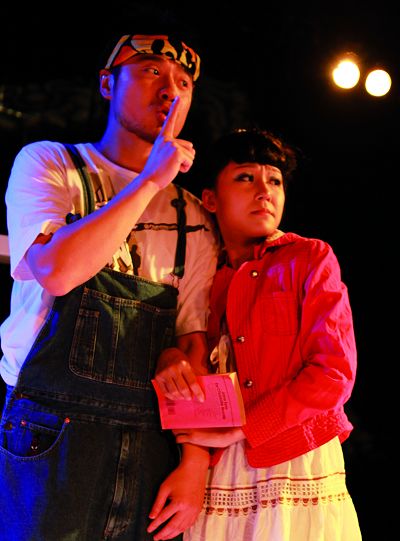On the fringe
|
|
|
A scene from Moonlight. [Global Times] |
Life in Liulizhuang premiered Saturday night and is an innovative and intriguing fuse of Chinese cross talk and drama. Set in ancient Chang'an, a capital city in the Tang Dynasty (618-907), the play is a derision of contemporary social phenomenon, quoting from history.
Presented by TV director Zhang Yichi and playwright Dongdongqiang, hardcore fans of Chinese stand-up comedy, the play received wide acclaim for its witty and poignant language that mocks heated social issues such as soaring house prices and bureaucracy. To interpret GDP as gao di pi (making money by real estate) is such an example. "As long-time cross-talk fans, the playwright Dongdongqiang and myself want to offer something different from the prevalent commercial comedies by combining elements of traditional cross-talk with Western drama," Zhang explained.
"As for the subject matter, we hope to leave the audience something to talk about after the laughter."
"This work is a typical example of Beijing school comedy which often features caricatures of social phenomenon and a really good script is the footstone to the play's success," commented audience member Zhang Dong after seeing the play.
"While the works of foreign masters move us by brilliant stories, high aesthetic taste and philosophical thinking, Chinese theaters are still struggling to search for intriguing stories and that's the difference," Meng commented.
"Theatrical playwrights are all seeking opportunities in film and TV industries. The appeal of drama is giving way to commercialization. It is the fringe festival that provides opportunities for young professions to gather together," commented Yu Lu, director and PhD student at the Central Academy of Drama.
To help solve the dilemma, a script workshop has been initiated by the fringe festival this year. Public reading of scripts from young playwrights and the 33 works in the festival will be held.
"Script reading is a brief rehearsal to test audience reaction. It's a very common practice abroad before a play enters the market. By organizing this event, the festival is attempting to bridge the writer and the audience members," explained Yang Qianwu, an organizer of the festival and general secretary of Beijing Dramatists Association.
In addition, a training seminar for young playwrights has been held by Beijing Dramatists Association. "After one year's training, the organization has signed with 10 playwrights. Each of these authors is given a monthly subsidy of 3,000 yuan ($445) and they will get copyright royalties when their works are staged," Yang said.
He added that the Beijing municipal government is also taking an active role in cultivating stage art. A sum of 20 million yuan ($2.97 million) has been allocated for the creation of new stage plays. "However, even many professionals are unaware of such policies or where to apply for the subsidy," Yang explained.
"Many independent theater makers are still busy finding money and get their shows staged with many excellent scripts aborted," he added.
For the young theater professionals, Beijing Fringe Festival is a window into the market, providing what is missing in the industry in the short term at least.
 0
0 








Go to Forum >>0 Comments